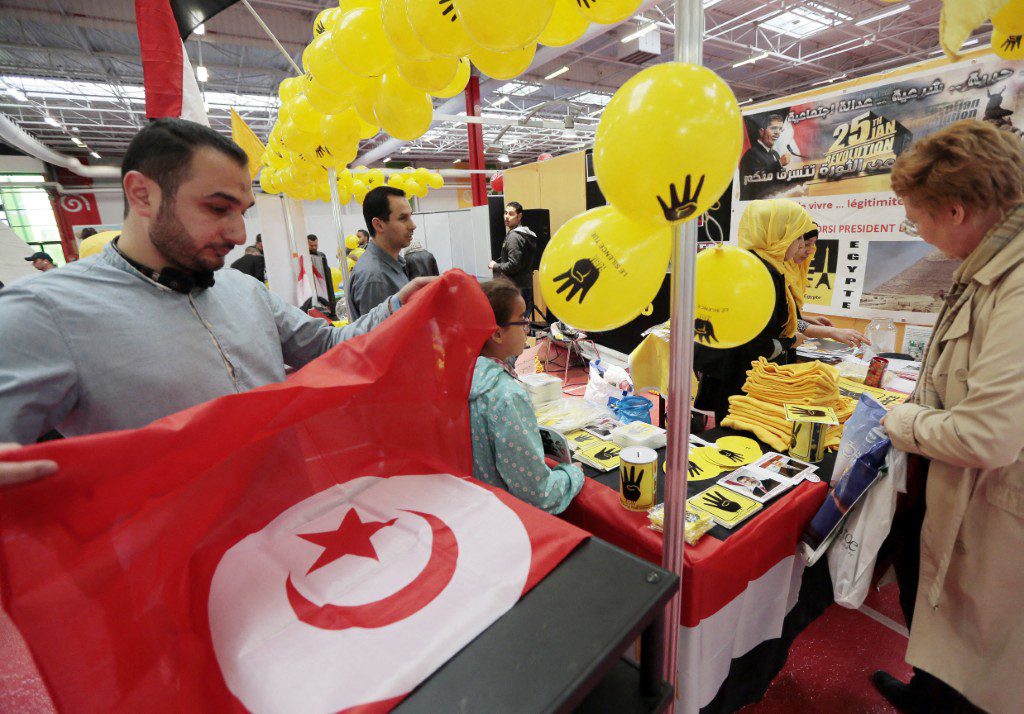
A picture of a pro-Muslim Brotherhood and pro-Morsi stand at the 31st annual meeting of the Muslims of France organised by the Union of Islamic Organisations of France (UOIF), at the exhibition centre of Le Bourget, near Paris, on April 18, 2014.
Photo by JACQUES DEMARTHON / AFP
France’s minister of the interior, Gérald Darmanin, has announced in the press that he wants to “fight back against the Muslim Brotherhood.” According to territorial intelligence, the Muslim Brotherhood, which aims to establish a global caliphate, has doubled its numbers in France in just a few years. At the Defence Council, the French president Emmanuel Macron asked for a report on the threat it poss—a welcome but late and inadequate recognition.
The interior minister speaks of a “race against time,” a “Gramscian” cultural/institutional battle against a “vicious” organisation, a “challenge.” Darmanin describes the mechanisms at work: “The Brotherist organisation does not use terrorism, it uses much softer methods, but it works effectively for the gradual tipping of all sections of society into the Islamic matrix.”
Since 2019, the Muslim Brotherhood has grown from 50,000 to 100,000 members. Its influence in France is very strong, as confirmed by an intelligence specialist for the Journal du Dimanche, which devoted its front page to Gérald Darmanin on Sunday, May 5th and had the opportunity to attend the meeting between the minister and the intelligence services on political Islamism.
President Macron commissioned two senior civil servants to produce a report on “political Islamism and the Muslim Brotherhood,” to be submitted in the autumn. This mission will be led by a diplomat, who has held numerous posts in Arab countries, and a prefect. In a press release, the government justifies its approach as follows:
Islamist separatism is a theorised politico-religious project, characterised by repeated departures from the principles of the Republic aimed at building a counter-society. The Muslim Brotherhood plays a major role in disseminating this system of thought.
Darmanin calls for a “wake-up call,” and accuses those “who collaborate with the Muslim Brotherhood without even knowing it, in the population but above all among public players.” Magistrates, elected representatives and academics—there are many who serve as a stepping stone to Islamism’s conquest.
Evidence of its infiltration into French life mounts almost daily. In 10 years, the proportion of Muslim women wearing the headscarf has doubled, making it possible to speak of a process of “indisputably orchestrated” cultural Islamisation, expressed in a host of symptoms: the growing prominence of community clothing such as the abaya; religious demands in the workplace and in swimming pools; growth in halal trading, and more.
Florence Bergeaud-Blackler, an academic who for many years has focused her research on the growth of the Muslim Brotherhood—and suffered the consequences of being threatened with death and ostracised from the academic community—knows the people responsible well. On X, she notes that the interior minister is finally using language that she herself has developed. Darmanin accuses the Muslim Brotherhood of working to make French society “Sharia-compatible.”
"Ils veulent rendre la société charia-compatible" : l'appel de Darmanin contre les Frères musulmans
— Florence Bergeaud-Blackler (@FBBlackler) May 5, 2024
Copyright FBB 🙂https://t.co/UOLoY6qJbw via @MarianneleMag
Le Journal du Dimanche, tells us that the minister of the interior considers the report useless, but nevertheless necessary to convince public opinion and decision-makers of the need to act.
We don’t need this report to understand what’s going on, we know that. But we do need it to convince France, its institutions, local elected representatives and decision-makers.
Take action, but to do what? The dissolution of the Muslim Brotherhood is already presented as “impossible,” because the organisation “does not formally exist.” Nevertheless, its shadow hangs over many structures and organisations present on French territory, such as the association Musulmans de France, whose president Amar Lasfar declared in 2017: “We are not part of the Muslim Brotherhood. But we are part of their school of thought.” A few years ago, the association’s endowment fund clearly claimed its link to the Muslim Brotherhood in its activity report, before removing it. Taqqyia, or dissimulation, is a practice perfectly mastered by these structures, as the intelligence services point out. The government certainly has the means to dissolve some of these organisations, but lacks the will to do so.
Gérald Darmanin explained that he wanted to draw inspiration from Austria’s policy on the Muslim Brotherhood. The country has blacklisted the organisation as an “extremist group linked to religiously motivated crime.” Since 2021 it has been forbidden in Austria to wear or distribute Brotherhood symbols, a “first” in Europe.
